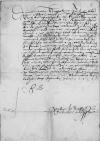Dem durchlauchten, hochgebornenn fursten und hern, / hernn ⌊Albrechtenn⌋, margraffennn zu ⌊Brandenburg⌋ etc. herczogenn inn ⌊Preussenn⌋ etc. meymm gnedigen, lyben hernn
Durchlauchter, hochgeborner furst, gnediger, liberr herrr. Meynn gancz willige dienste zuvorann. /
Noch demm ich gesunt bin her komenn, / hot mich meynn gunstiger freundt, herr ⌊Achacius Czeme⌋, danczker castellann, bericht, / wie bey im sey Ewer Gnaden bot, / der sich dissen tag widerummb zu Ewer Gnaden sol begebenn. / Und wie wol ich negst vomm ⌊Altenn Hause⌋ Ewer Gnaden ⌊⌋, / hab ich dennoch / nicht mocht noch lossenn abermals Ewer Gnaden mit dissemm meynemm schreibenn zubesuchenn, / nemlich der halbenn, / so es villeichte Ewer Gnaden genn ⌊Resenburg⌋ zu komenn nicht wer gelegenn, / wolde mir einn andre nahent bey stelle seczennn, / do hin ich mich, / vorlossende andere vorgenomenn wege, / mocht aus disser ⌊tagefart⌋ findennn, / dann in allemm Ewer Gnaden fruntlich unnnd williglich zu dynenn / wil ich alzeit gehorszamm gefunden werdenn / unnd thu mich so hiemit in Ewer Gnaden gunst hochlich befelenn. / Got der almechtige spare Ewer Gnade in langeweriger glugseligheit und zunemenn lange zceit gesunt. /
Datum ⌊Marienburg⌋, dennn leczstenn tag Septembris anno domini 1532.
Eweren Furstlichen Gnaden
williger ⌊Joannes⌋, bischoff zu ⌊Culmenn⌋ etc. manu propria
Ewer Gnaden wirt mich vonn hynnenn lösennn mit dem erstenn schreiben. / So werd ich ouch ursach habennn mit guttem gelÿmff vonn hynnenn zu scheidenn. / Bitt derhalbenn mit denn ersten ummb ein gunstig antwurt.



